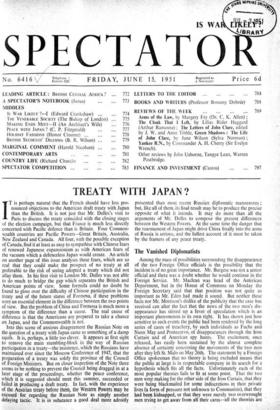TREATY WITH JAPAN ?
IT is perhaps natural that the French should have less pro- nounced objections to the American draft treaty with Japan than the British. It is not just that Mr. Dulles's visit to Paris to discuss the treaty coincided with the closing stages of the election campaign, but that France is much less directly concerned with Pacific defence than is Britain. Four Common- wealth countries are Pacific Powers—Great Britain, Australia, New Zealand and Canada. All four, with the possible exception of Canada, find it at least as easy. to sympathise with Chinese fears of renewed Japanese expansionism as with American fears of the vacuum which a defenceless Japan would create. An article on another page of this issue analyses these fears, which are so real that they could make the prospect of no treaty at all preferable to the risk of seeing adopted a treaty which did not allay them. In his first visit to London Mr. Dulles was not able to do much to bridge the gap which separates the British and American points of view. Some formula could no doubt be found to gloss over the difficulty of Chinese participation in the treaty and of the future status of Formosa. if these problems were an essential element in the difference between the two points of view. But the problem of China and Formosa is much more a symptom of the difference than a cause. The real cause of difference is that the Americans are prepared to take a chance on Japan, and the Commonwealth is not. Into this scene of anxious disagreement the Russian Note on the question of a treaty with Japan came as something of a damp squib. It is, perhaps, a little too clever. It appears at first sight to remove the main stumbling-block in the way of Russian participation in a treaty—the insistence, which the Russians have maintained ever since the Moscow Conference of 1947, that the preparation of a treaty was solely the province of the Council of Foreign Ministers. But on closer inspection of the Note there seems to be nothing to prevent the Council being dragged in at a later stage of the proceedings, whether the peace conference, which it is suggested should meet this summer, succeeded or faded in producing a draft treaty. In fact, with the experience of the Austrian treaty before them, the Western Powers may be excused for regarding the Russian Note as simply another delaying tactic. It is in substance a good deal more adroitly presented than most recent Russian diplomatic manoeuvres ; but, like all of them, its final result may be to produce the precise opposite of what it intends. It may do more than all the arguments- of Mr. Dulles to compose the present differences between the Western Powers. At the same time the danger that the rearmament of Japan might drive China finally into the arms of Russia is serious, and the fullest account of it must be taken by the framers of any peace treaty.


































